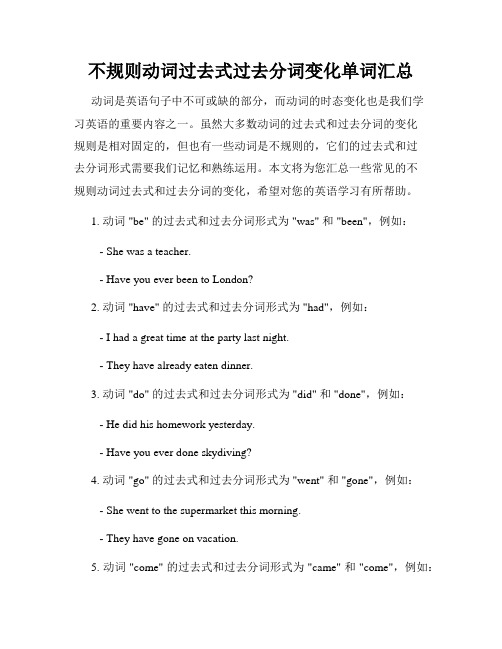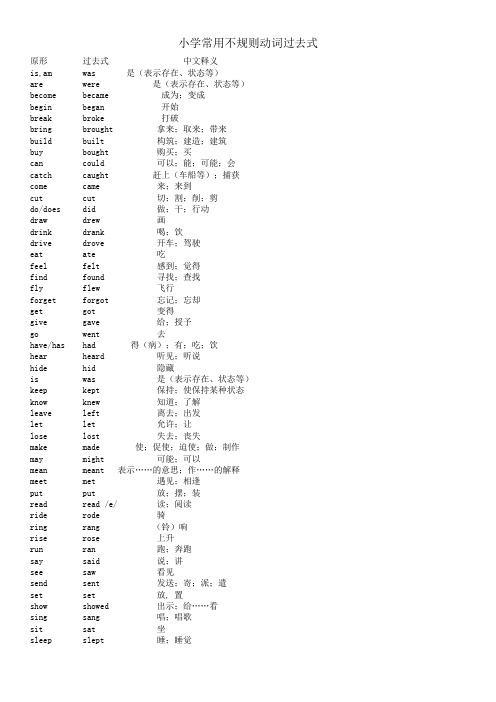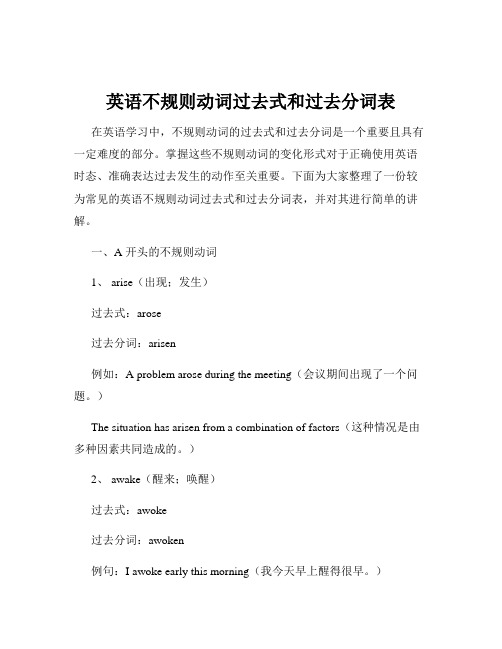小学英语需熟记不规则动词过去式及单词
小学英语常用不规则动词过去式

小学常用不规则动词过去式原形过去式中文释义am was 是(表示存在、状态等)are were 是(表示存在、状态等)become became 成为;变成begin began 开始break broke 打破bring brought 拿来;取来;带来build built 构筑;建造;建筑buy bought 购买;买can could 可以;能;可能;会catch caught 赶上(车船等);捕获come came 来;来到cut cut 切;割;削;剪do/does did 做;干;行动draw drew 画drink drank 喝;饮drive drove 开车;驾驶eat ate 吃feel felt 感到;觉得find found 寻找;查找fly flew 飞行forget forgot 忘记;忘却get got 变得give gave 给;授予go went 去have/has had 得(病);患(病);有;吃;饮hear heard 听见;听说hide hid 隐藏is was 是(表示存在、状态等)keep kept 保持;使保持某种状态leave left 离去;出发let let 允许;让lose lost 失去;丧失make made 使;促使;迫使;做;制作may might 可能;可以mean meant 表示……的意思;作……的解释meet met 遇见;相逢put put 放;摆;装read read /e/ 读;阅读ride rode 骑ring rang (铃)响rise rose 上升run ran 跑;奔跑say said 说;讲see saw 看见send sent 发送;寄;派;遣set set 放, 置show showed 出示;给……看shut shut 关上(门、盖、窗户等)sing sang 唱;唱歌sit sat 坐sleep slept 睡;睡觉speak spoke 说;说话swim swam 游泳take took 搭乘;花费(时间);拿走;带到teach taught 教;讲授tell told 告诉;讲述think thought 想;思考will would 将要win won 赢;获胜write wrote 书写不规则动词的过去式的构成1.把动词原形中的i改为a,变成过去式。
英语不规则动词过去式及单词

不规则动词过去式am/is –was are—were have/has—had do/does—did can—could will—would shall—shouldswim—swam sing—sang ring—rang sit—sat e—came give—gave run—ran drink—drank bee—became begin—beganbuy—bought bring—brought catch—caught think—thought teach—taughtsend—sent build—built go—went spend—spent lose—lost lend—lent mean—menat sweep—swept feel—felt learn—learnt/learned smell—smelt sleep—sleptput—put cut—cut hit—hit read—read hurt—hurt let—let beat—beat cost—costwrite—wrote ride—rode rise—rose win—won drive—drove speak—spoke get—got forget—forgot choose—chose sell—sold wake—woke break—brokefly—flew/flied blow—blew draw—drew know—knew throw—threw grow—grew see—saw say—said hold—held take—took understand—understood stand—stood may—might meet—met eat—ate leave—left wear—wore hear—heard make—made hang—hung lie—lay fall—fell dig—dug find—found steal—stole常用单词一、人称代词二、基数词One two three four five six seven eight nine ten eleven twelve thirteen fourteen fifteen sixteen seventeen eighteen nineteen twenty thirty forty fifty sixty seventy eighty ninety hundred thousand million billion三、常用动词listen say speak talk read write play sing dance swim jump run eat stand sit fly see look watch go e want like love visit四、常用疑问词what when where which who whose how how many how much how old how long how big how far what time what colour what number how often五、Be动词、助动词、情态动词Be动词am is was are were助动词do does did情态动词can could will would shall should may might have got has got must need等六、颜色black write red green yellow orange pink brown purple七、交通工具car plane bus boat ship train bike bicycle taxi八、常见水果(fruit)apple pear banana orange watermelon mango tomato peach grape strawberry九、动物(animal)dog cat duck chick bird fish panda snake lion parrot dragon tiger monkey elephant bear owl goose horse十、文具bag book pen pencil ruler chair desk eraser paper pencil-box dictionary sharpener十一、星期、天与季节(week\day\season )Monday Tuesday Wednesday Thursday Friday Saturday Sundayspring summer autumn/fall winter十二、月份(month)January February March April May June July August September October November December十三、时间morning afternoon evening tonight night year tomorrow minute today yesterday weekend holiday十四、身体部位ear hand arm eye head foot mouth leg nose hair shoulder face finger lip十五、家庭dad father mum mother brother sister grandpa grandma grandmother grandfather consin parents aunt uncle nephew十六、职业teacher doctor driver nurse farmer pupil worker policeman student dancer fireman十七、指示代词this that these those here there十八、天气warm hot cool cold rainy sunny windy cloudy snowy wet dry十九、常见形容词fat thin tall short long small big old young little strong large light nice new lovely funny clever good bad cute naughty beautiful easy difficult hard二十、介词In on at behind front between under after before for near about above to next to from二十一、国家China Japan England France America Canada Australia Mexico Spain Italy Korea Germany Greece India Russia二十二、衣物shirt T-shirt sweater coat trousers pants jeans skirt dress hat capsock shorts underwear shoe二十三、食物rice meat egg bread cake biscuit noodle milk fish ice cream chocolate cheese hot dog sausage chips moon cake juice sweet tea corn beaf soup fast food dumping二十四、节目Spring Festival Lantern Festival Dragon Boot Festival(端午节) Mid-Autumn Festival Christmas Women’s Day Children’s Day Teacher’s Day Thanksgiving(万圣节) Halloween(感恩节)二十五、学科maths ChineseEnglish PE/art/music Lesson science geography history Olympic Maths puter chemistry。
英语不规则动词过去式表(附音标)

英语不规则动词过去式表(附音标)咱们在学英语的时候,不规则动词的过去式可有点像调皮的小怪兽呢。
不过别担心,咱们一起把它们都弄清楚。
先来说说“be”这个超级重要的动词。
它的过去式有两种,“was”[wɒz]和“were”[wɜː(r)]。
我给你们讲个小故事呀。
有一天,小明一个人在家的时候,他就可以说“I was at home alone.”(我独自在家)。
要是说小明和他的小伙伴们一起在公园呢,那就是“We were in the park.”(我们在公园)。
“have”这个动词,它的过去式是“had”[hæd]。
比如说,小红昨天有一个漂亮的气球,就可以说“Xiaohong had a beautiful balloon yesterday.”(小红昨天有一个漂亮的气球)。
“do”的过去式是“did”[dɪd]。
想象一下,老师问你:“你做家庭作业了吗?”如果是昨天的事,你就可以说“I did my homework.”(我做了我的家庭作业)。
“go”的过去式是“went”[went]。
周末的时候,小刚和家人去了动物园,那就是“Xiaogang went to the zoo with his family.”(小刚和他的家人去了动物园)。
“see”的过去式是“saw”[sɔː]。
小花在公园里看到了一只可爱的小狗,就可以说“Xiaohua saw a lovely dog in the park.”(小花在公园里看到了一只可爱的小狗)。
“eat”的过去式是“ate”[et]。
昨天,小李吃了一个大大的苹果,那就是“Xiaoli ate a big apple yesterday.”(小李昨天吃了一个大大的苹果)。
“come”的过去式是“came”[keɪm]。
朋友邀请小美来家里玩,小美就说“I came to your home.”(我来到你家了)。
“take”的过去式是“took”[tʊk]。
不规则动词过去式过去分词变化单词汇总

不规则动词过去式过去分词变化单词汇总动词是英语句子中不可或缺的部分,而动词的时态变化也是我们学习英语的重要内容之一。
虽然大多数动词的过去式和过去分词的变化规则是相对固定的,但也有一些动词是不规则的,它们的过去式和过去分词形式需要我们记忆和熟练运用。
本文将为您汇总一些常见的不规则动词过去式和过去分词的变化,希望对您的英语学习有所帮助。
1. 动词 "be" 的过去式和过去分词形式为 "was" 和 "been",例如:- She was a teacher.- Have you ever been to London?2. 动词 "have" 的过去式和过去分词形式为 "had",例如:- I had a great time at the party last night.- They have already eaten dinner.3. 动词 "do" 的过去式和过去分词形式为 "did" 和 "done",例如:- He did his homework yesterday.- Have you ever done skydiving?4. 动词 "go" 的过去式和过去分词形式为 "went" 和 "gone",例如:- She went to the supermarket this morning.- They have gone on vacation.5. 动词 "come" 的过去式和过去分词形式为 "came" 和 "come",例如:- He came to the party late.- I have never come across such a difficult problem before.6. 动词 "see" 的过去式和过去分词形式为 "saw" 和 "seen",例如:- I saw her at the park yesterday.- Have you seen that movie?7. 动词 "eat" 的过去式和过去分词形式为 "ate" 和 "eaten",例如:- We ate pizza for lunch.- She has eaten sushi before.8. 动词 "drink" 的过去式和过去分词形式为 "drank" 和 "drunk",例如:- He drank a glass of water after exercise.- Have you ever drunk coconut water?9. 动词"give" 的过去式和过去分词形式为"gave" 和"given",例如:- She gave me a gift for my birthday.- They have given all their efforts to the project.10. 动词 "take" 的过去式和过去分词形式为 "took" 和 "taken",例如:- He took a nap in the afternoon.- Have you taken the medicine yet?11. 动词 "break" 的过去式和过去分词形式为 "broke" 和 "broken",例如:- I broke my phone accidentally.- The window has been broken.12. 动词 "choose" 的过去式和过去分词形式为 "chose" 和 "chosen",例如:- She chose the blue dress for the party.- The best option has been chosen.13. 动词 "write" 的过去式和过去分词形式为 "wrote" 和 "written",例如:- I wrote a letter to my friend yesterday.- Have you ever written a poem?14. 动词 "see" 的过去式和过去分词形式为 "saw" 和 "seen",例如:- I saw a beautiful sunset at the beach.- The movie has been seen by millions of people.15. 动词 "think" 的过去式和过去分词形式为 "thought",例如:- He thought about the problem for a long time.- I have always thought that she is a talented artist.以上是一些常见的不规则动词过去式和过去分词的变化,掌握这些变化规则能够帮助您更准确地运用英语动词时态,提高语言表达的准确性和流畅性。
小学英语常用不规则动词过去式

小学常用不规则动词过去式原形过去式中文释义is,am was 是(表示存在、状态等)are were 是(表示存在、状态等)become became 成为;变成begin began 开始break broke 打破bring brought 拿来;取来;带来build built 构筑;建造;建筑buy bought 购买;买can could 可以;能;可能;会catch caught 赶上(车船等);捕获come came 来;来到cut cut 切;割;削;剪do/does did 做;干;行动draw drew 画drink drank 喝;饮drive drove 开车;驾驶eat ate 吃feel felt 感到;觉得find found 寻找;查找fly flew 飞行forget forgot 忘记;忘却get got 变得give gave 给;授予go went 去have/has had 得(病);有;吃;饮hear heard 听见;听说hide hid 隐藏is was 是(表示存在、状态等)keep kept 保持;使保持某种状态know knew 知道;了解leave left 离去;出发let let 允许;让lose lost 失去;丧失make made 使;促使;迫使;做;制作may might 可能;可以mean meant 表示……的意思;作……的解释meet met 遇见;相逢put put 放;摆;装read read /e/ 读;阅读ride rode 骑ring rang (铃)响rise rose 上升run ran 跑;奔跑say said 说;讲see saw 看见send sent 发送;寄;派;遣set set 放, 置show showed 出示;给……看sing sang 唱;唱歌sit sat 坐sleep slept 睡;睡觉原形过去式中文释义speak spoke 说;说话swim swam 游泳take took 搭乘;花费(时间);拿走;带到teach taught 教;讲授tell told 告诉;讲述think thought 想;思考will would 将要win won 赢;获胜write wrote 书写。
英语不规则动词过去式和过去分词表

英语不规则动词过去式和过去分词表在英语学习中,不规则动词的过去式和过去分词是一个重要且具有一定难度的部分。
掌握这些不规则动词的变化形式对于正确使用英语时态、准确表达过去发生的动作至关重要。
下面为大家整理了一份较为常见的英语不规则动词过去式和过去分词表,并对其进行简单的讲解。
一、A 开头的不规则动词1、 arise(出现;发生)过去式:arose过去分词:arisen例如:A problem arose during the meeting(会议期间出现了一个问题。
)The situation has arisen from a combination of factors(这种情况是由多种因素共同造成的。
)2、 awake(醒来;唤醒)过去式:awoke过去分词:awoken例句:I awoke early this morning(我今天早上醒得很早。
)The noise awoke him(噪音把他吵醒了。
)二、B 开头的不规则动词1、 be(是;存在)过去式:was(第一、三人称单数)/were(第二人称单数和复数)过去分词:been例如:He was at home yesterday(他昨天在家。
)They were happy(他们很开心。
)I have been to Beijing twice(我去过北京两次。
)2、 bear(忍受;生育)过去式:bore过去分词:borne / born如:She couldn't bear the pain(她无法忍受疼痛。
)She has borne three children(她生了三个孩子。
)3、 beat(打败;拍打)过去式:beat过去分词:beaten“Our team beat theirs yesterday (我们队昨天打败了他们队。
)He has been beaten in the race (他在比赛中被打败了。
英语不规则动词过去式过去分词--不规则动词记忆规律
英语不规则动词过去式过去分词--不规则动词记忆规律
虽然英语有些动词的过去式和过去分词变化不规则,但可以把这些不规则动词的变化成分几种形式来记忆:
1、AAA型(原形→原形→原形)
2、AAB型
3、ABA型(原形→过去式→原形)
4、ABB型
(1)、在动词原形后加一个辅音字母d, t或ed构成过去式或过去分词。
(2)、把动词原形的最后一个辅音字母“d”改为“t”构成过去式或过去分词。
(3)、原形→ought →ought
(4)、原形→aught →aught
(5)、变其中一个元音字母
(6)、原形→□lt/pt/ft→□lt/pt/ft
(7)、其它(无规律)
5、ABC型
(1)、原形→ew→own
(2)、原形→过去式→原形+(e)n
(3)、原形→过去式→过去式+(e)n
(4)、变单词在重读音节中的元音字母“i”分别为“a”(过去式)和“u”(过去分词),即[i→a →u]
(5)、其它(无规律)
6、一个动词有两种变化形式
7、情态动词(无过去分词)
后附:《初中英语不规则动词记忆表》英语不规则动词初中记忆表
1.AAA型(原形→原形→原形)
3.ABA(原形→过去式→原形)
(4)、原形→aught →aught。
不规则英语动词过去式与过去分词表
常用动词的过去式、过去分词不规则变化的规律一、A--A--A型, 即原形、过去式和过去分词三者都相同。
(共9个)1.cost[kɔst]--cost--cost--costing['kɔstɪŋ]--costs[kɔsts]n.价格, 成本, 费用;代价, 损失.vi.价钱为; 花费.vt.付出(代价), 失去;估价2.cut[kʌt]--cut--cut--cutting['kʌtɪŋ]--cutsvt.& vi.切, 剪, 割, 削.vt.削减;挖成; 刻成;使(某人)感到疼痛或痛苦;(直线)与(另一条直线)相交;不出席, 不到场;灌制(唱片)n.切, 割, 砍; 用刀等割的破口;减少, 减少; 删减;裁剪样式;伤感情的话或行为3.hit[hit]--hit--hit--hitting [hɪtɪŋ]--hitsvt.& vi.打, 打击;碰撞.vt.伤害, 殃及.n.一击, 击中;成功而风行一时的事物4.hurt[hə:t]--hurt--hurt--hurting[hə:tɪŋ] --hurtsvt.使受伤; 伤害.vi.疼痛.vt.& vi.对…有害; 对…有不良影响n.肉体上的伤害[痛苦];精神上的痛苦[创伤]5.let[let]--let--let --letting [ˈletɪŋ]--letsvt.让, 使;放掉, 松掉.vt.& vi.出租6.put[put]--put--put--putting['pʊtɪŋ]--putsvt.放; 置;使处在(某种状态);表达, 叙述, 说明7.read[ri:d]--read[red]--read[ri:d] --reading--readsvt.& vi.读; 看懂, 理解.vt.显示; 标明8.set[set]--set--set--setting--setsvt.放, 搁置.vi.(日、月等)落, 下沉;(植物)结子, 结果.n.(一)套, (一)副;收音机; 电视机adj.固定的; 指定的;不变的9.shut[ʃʌt]--shut--shut--shutting--shutsvt.& vi.关, 关上二、A--B--B型, 即过去式、过去分词相同。
不规则过去式所有单词
不规则过去式所有单词一、AAA型(原形、过去式、过去分词同形)1. cost [kɒst] (v.) - cost - cost.- 例句:The book cost me ten yuan yesterday.(昨天这本书花了我10元。
)2. cut [kʌt] (v.) - cut - cut.- 例句:He cut his finger just now.(他刚刚割破了手指。
)3. hit [hɪt] (v.) - hit - hit.- 例句:The ball hit the window.(球击中了窗户。
)4. hurt [hɜːt] (v.) - hurt - hurt.- 例句:She hurt her leg last week.(她上周伤到了腿。
)5. let [let] (v.) - let - let.- 例句:Let me help you.(过去式:He let me help him yesterday. 他昨天让我帮助他。
)二、ABA型(原形与过去分词同形)1. become [bɪˈkʌm] (v.) - became [bɪˈkeɪm] - become.- 例句:He became a teacher last year.(他去年成为了一名教师。
)2. come [kʌm] (v.) - came [keɪm] - come.- 例句:She came to my house yesterday.(她昨天来到了我家。
)三、ABB型(过去式与过去分词同形)1. bring [brɪŋ] (v.) - brought [brɔːt] - brought.- 例句:He brought his book to school.(他把他的书带到学校来了。
)2. build [bɪld] (v.) - built [bɪlt] - built.- 例句:They built a new house last month.(他们上个月建了一座新房子。
英语不规则动词过去式及单词
不规则动词过去式am/is -vasare —were have/has ——had do/does ——did can —could will —would shall —shouldswim —swam sin g —sa ng ring —rang sit —sat come — came give —gave run —randrink —dra nkbecome —became beg in —bega nbuy —bought brin g —brought catch —caught think —thought teach —taughtsen d —se nt build —builtgo —we nt spe nd —spe nt lose —lost len d —le nt mea n —menatsweep —swept feel —felt lear n —lear nt/lear ned smell — smelt sleep —sleptput —put cut —cut hit —hit read —read hurt —hurtun dersta nd —un derstood sta nd —stood may — mightmeet —met eat —ate leave —left wear —wore hear —heard make —made han g —hu ng lie —lay fall —felldig — dug find —foundsteal — stole常用单词let —let beat —beat cost —costwrite —wrote ride —rode rise —rose win —won drive —drove speak —spoke get —gotforget —forgot choose —chose sell — sold wake —woke break —brokefly —flew/fliedblow —blew draw —drew know —knew throw —threw grow —grew see — sawsay —said hold —held take —took人称代词基数词One two three four five six seven eight nine ten eleven twelve thirteen fourteen fifteen sixteenseventeen eighteen nineteen twenty thirty forty fifty sixty seventy eighty ninety hundred thousand million billion三、常用动词listen say speak talk read write play sing dance swim jump run eat stand sit fly see look watch go come want like love visit四、常用疑问词what when where which who whose how how many how much how old how long how big how far what time what colour what number how oftenblack write red green yellow orange pink brown purple七、交通工具car plane bus boat ship train bike bicycle taxi八、常见水果(fruit)apple pear banana orange watermelon mango tomato peach grape strawberry五、Be 动词、助动词、情态动词Be动词am is was are were助动词do does did情态动词can could will would shall should may might have got has got must need 等六、颜色九、动物(animal)dog cat duck chick bird fish panda snake lion parrot dragon tiger monkey elephant bear owl goose horse十、文具bag book pen pencil ruler chair desk eraser paper pencil-box dictionary sharpener十一、星期、天及季节(week\day\season )Monday Tuesday Wednesday Thursday Friday Saturday Sundayspring summer autumn/fall winter十二、月份(month)January February March April May June July August September October November December十三、时间morning afternoon evening tonight night year tomorrow minute today yesterday weekend holiday十四、身体部位ear hand arm eye head foot mouth leg nose hair shoulder face finger lip十五、家庭dad father mum mother brother sister grandpa grandma grandmother grandfather consin parents aunt uncle nephew十六、职业teacher doctor driver nurse farmer pupil worker policeman student dancer fireman十七、指示代词this that these those here there十八、天气warm hot cool cold rainy sunny windy cloudy snowy wet dry十九、常见形容词fat thin tall short long small big old young little strong large light nice new lovely funny clever good bad cute naughty beautiful easy difficult hard二十、介词In on at behind front between under after before for near about above to next to from一、国家China Japan England France America Canada Australia Mexico Spain Italy KoreaGermany Greece India Russia二十二、衣物shirt T-shirt sweater coat trousers pants jeans skirt dress hat cap sock shorts underwear shoe二十三、食物rice meat egg bread cake biscuit noodle milk fish ice cream chocolate cheese hot dog sausage chips moon cake juice sweet tea corn beaf soup fast food dumping二十四、节目Spring Festival Lantern Festival Dragon Boot Festival端午节) Mid-Autumn Festival ChristmasWomen'Day Children'Day Teache'sDay Thanksgiving万圣节) Halloween (感恩节)二十五、学科maths Chinese English PE/art/music Lesson science geography history Olympic Maths英语不规则动词过去式及单词computer chemistry。
- 1、下载文档前请自行甄别文档内容的完整性,平台不提供额外的编辑、内容补充、找答案等附加服务。
- 2、"仅部分预览"的文档,不可在线预览部分如存在完整性等问题,可反馈申请退款(可完整预览的文档不适用该条件!)。
- 3、如文档侵犯您的权益,请联系客服反馈,我们会尽快为您处理(人工客服工作时间:9:00-18:30)。
小学一些常记单词:A.规则动词的过去式变化如下:一般情况下,动词词尾加-ed ,如:worked played wanted acted以不发音的-e 结尾动词,动词词尾加-d,如:lived moved decided declined hoped judged raised wiped以辅音字母+ y结尾的动词,把-y变为-i 再加-ed,如:studied tried copied justified cried carried embodied emptied 以一个辅音字母结尾的重读闭音节动词,双写词尾辅音字母,再加-ed,如:stopped begged fretted dragged dropped planned dotted dripped 注:不规则动词的过去式变化规律性不强,须多加记忆。
go - went make - made get - got buy - bought come - came fly-flewB.不规则动词过去式及过去分词:am/is –was are—were have/has—had do/does—did can—could will—would shall—shouldswim—swam sing—sang ring—rang sit—sat come—came give—gave run—ran drink—drank become—became begin—beganbuy—bought bring—brought catch—caught think—thought teach—taughtsend—sent build—built go—went spend—spent lose—lost lend—lent mean—menat sweep—swept feel—felt learn—learnt/learned smell—smelt sleep—sleptput—put cut—cut hit—hit read—read hurt—hurt let—let beat—beat cost—costwrite—wrote ride—rode rise—rose win—won drive—drove speak—spoke get—got forget—forgot choose—chose sell—sold wake—woke break—brokefly—flew/flied blow—blew draw—drew know—knew throw—threw grow—grew see—saw say—said hold—held take—took understand—understood stand—stood may—might meet—met eat—ate leave—left wear—wore hear—heard make—made hang—hung lie—lay fall—fell dig—dug find—found steal—stoleC.常用单词1. 人称代词人称代词第一人称第二人称第三人称第一人称第二人称第三人称句中位置主格I you he she it we you they 句首、句末宾格me you him her its us you them 动词、介词之后形代my your his her its our your their 名词之前名代mine yours his hers its ours yours theirs 后不加名词反身代词myself yourself himselfherselfitself ourselvesyourselvesthemselves通常与by连用2. 基数词One two three four five six seven eight nine ten eleven twelve thirteen fourteen fifteen sixteen seventeen eighteen nineteen twenty thirty forty fifty sixty seventy eighty ninety hundred thousand million billion3. 常用动词listen say speak talk read write play sing dance swim jump run eat stand sit fly see look watch go come want like love visit4. 常用疑问词what when where which who whose how how many how much how old how long how big how far what time what colour what number how oftenBe动词、助动词、情态动词Be动词am is was are were助动词do does did情态动词can could will would shall should may might have got has got must need等5. 颜色black write red green yellow orange pink brown purple6. 交通工具car plane bus boat ship train bike bicycle taxi7. 常见水果(fruit)apple pear banana orange watermelon mango tomato peach grape strawberry8. 动物(animal)dog cat duck chick bird fish panda snake lion parrot dragon tiger monkey elephant bear owl goose horse9. 文具bag book pen pencil ruler chair desk eraser paper pencil-box dictionary sharpener10. 星期、天及季节(week\day\season )Monday Tuesday Wednesday Thursday Friday Saturday Sundayspring summer autumn/fall winter11. 月份(month)January February March April May June July August September October November December12. 时间morning afternoon evening tonight night year tomorrow minute today yesterday weekend holiday14. 身体部位ear hand arm eye head foot mouth leg nose hair shoulder face finger lip15. 家庭dad father mum mother brother sister grandpa grandma grandmother grandfather consin parents aunt uncle nephew16. 职业teacher doctor driver nurse farmer pupil worker policeman student dancer fireman17. 指示代词this that these those here there18. 天气warm hot cool cold rainy sunny windy cloudy snowy wet dry19. 常见形容词fat thin tall short long small big old young little strong large light nice new lovely funny clever good bad cute naughty beautiful easy difficult hard20.介词In on at behind front between under after before for near about above to next to from21. 国家China Japan England France America Canada Australia Mexico Spain Italy Korea Germany Greece India Russia22.衣物shirt T-shirt sweater coat trousers pants jeans skirt dress hat cap sock shorts underwear shoe23. 食物rice meat egg bread cake biscuit noodle milk fish ice cream chocolate cheese hot dog sausage chips moon cake juice sweet tea corn beaf soup fast food dumping24. 节目Spring Festival Lantern Festival Dragon Boot Festival(端午节) Mid-Autumn Festival Christmas Women’s Day Children’s Day Teacher’s Day Thanksgiving(万圣节) Halloween(感恩节)25. 学科maths Chinese English PE/art/music Lesson science geography history Olympic Maths computer chemistry。
